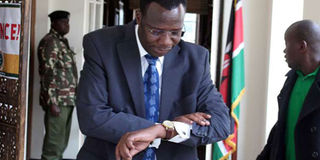Seven High Court judges should hear presidential petitions, says Wanjala

Supreme Court judge Dr Smokin Wanjala checks his watch after his interview with the Judicial Service Commission for the Chief Justice position on September 3, 2016. Dr Wanjala told JSC that presidential election petitions should be heard by seven High Court judges elected through secret ballot. PHOTO | DENNIS ONSONGO | NATION MEDIA GROUP
What you need to know:
- Dr Wanjala said after the ruling, only his children and his mother sympathised with him thereafter from the criticism that ensued.
- The petition had been filed by Cord leader Raila Odinga challenging the election of President Uhuru Kenyatta.
- Dr Wanjala made a strong bid for the job saying he would continue with the transformative agenda started by Willy Mutunga.
Supreme Court judge Smokin Wanjala on Saturday confessed that hearing the 2013 presidential election petition was his toughest assignment he has ever undertaken.
Justice Wanjala told the Judicial Service Commission (JSC) that is interviewing shortlisted candidates for the Chief Justice’s job that given a choice, he would not wish to adjudicate on a similar petition.
He suggested that such petitions should be heard by seven High Court judges elected through a secret ballot rather than five Supreme Court judges.
“With an option, I would never want to sit and preside over an election petition matter. The criticisms that come are never jurisprudential. Whichever way you decide a presidential election petition, you will annoy half of the Kenyan people and you will make the other half very happy,” said Dr Wanjala.
He said after the ruling, only his children and his mother sympathised with him thereafter from the criticism that ensued.
The petition had been filed by Cord leader Raila Odinga challenging the election of President Uhuru Kenyatta citing irregularities and that it was not free and fair. He said the IEBC conspired to rig him out.
He has since successfully led his troops to demand the disbandment of the commission.
Dr Wanjala made a strong bid for the job, stating that should he occupy the office, he would continue with the transformative agenda started by Willy Mutunga and take it to a logical conclusion before embarking on the innovation agenda.
He said he will fast track the setting up of an International Crimes Division by invoking his administrative authority as the consultations initiated by the retired Dr Mutunga are complete.
He also pledged to dismantle cartels in the judiciary. “I have heard of them though I am not aware of any kind of cartel as I have been performing my duties as a judge.”
“If they exist I will trigger the process of their disruption and destruction. They must be destroyed. We cannot run as an institution of cartels,” said Dr Wanjala.
He lamented the lack of fully automated courts in Kenya and said he would realize that vision within two years of his tenure.
He said he would like to be a CJ who will be associated with providing judicial insights and leadership and a court that not only believes in unison but also diversity of ideas.
He defended his decision which was among the majority ruling in the two thirds gender principle petition at Supreme Court where he rooted for the progressive realisation of the principle.
“The constitution gave a formulae on how that was to be realized in county assemblies and not in the National Assembly. It states that the state should take legislative and other measures to get the numbers.”
“The Supreme Court is not to be blamed for the conundrum. We ruled for the progressive realization and gave a timeframe which has already lapsed,” he said.
He also defended his tenure at the then troubled Kenya Anti-Corruption Authority, saying he introduced many changes for the fight on corruption. He cited his reappointed as the assistant director of the commission as a challenging moment for him due to the public debate that ensued forcing him to quit for public interest.
He said the established special anti-corruption courts had no value in war on graft and want to have them disbanded.
Dr Wanjala also promised to eliminate the green robes worn by Supreme Court judges and have them dressed simply in official apparel. He said the reference to judges as ‘Lords’ is imperial and should be done away with.
He also said he will use his immense networks both locally and internationally to advocate hosting of biannual judiciary conferences to discuss questions and challenges of jurisprudence to strengthen the Judiciary and to make it more efficient.
The interviews continue at the Supreme Court next week where initially non-shortlisted applicants for the post will be interviewed with Paul Kongani Udoto Kongani facing the panel on Monday. The High Court ordered the JSC to reconsider them.




